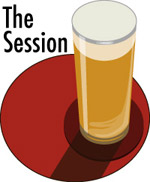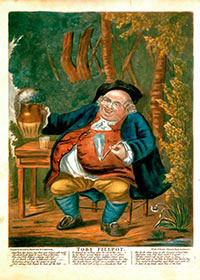MONDAY BEER & WINE LINKS, MUSING 11.02.15
Things Fall Apart.
[Via All About Beer]
Why Do Breweries Sell Out? (Part One).
[Via St. John’s Wort]
Craft Brew Alliance and the Search for a New ‘Local’.
[Via This Is Why I’m Drunk]
Why beer mergers don’t really matter to drinkers.
[Via MarketWatch]
Yes, but…
I won’t repeat everything from this August post, only a bit: “Twenty years ago Boston Beer sales accounted for 25.1% of craft* sales and the 50 largest craft breweries for 77.5%. Ten years ago, Boston Beer’s share was 19.4% and the 50 largest sold 79.7% of craft. Last year, Boston Beer’s share was 13.2% and the 50 largest’s 68.1%.” The smallest breweries in America are holding their own. Granted, not every brewery owner is content to run a small business, and not every drinker cares about local, but apparently enough do.
* As defined by the Brewers Association at the time.
‘Beer Gets the Connoisseur Treatment’, 1968.
“There are some other interesting general observations: beer, the wine-taster noted, is fundamentally sweet-tasting, despite its reputation for bitterness. The tea-taster was surprised by the importance of ‘nose’ in beer having apparently never taken a moment to give it a sniff before Cyril Ray asked him to.” [Via Boak & Bailey’s Beer Blog]
Top Brewery Road Trip, Routed Algorithmically.
Because there are things like genetic algorithms and the Google Maps API. [Via Flowing Data]
Reclaiming beer snobbery.
Some well made points, but you can’t simply type “a snob is not dogmatic” and have it be true. Sometimes it is not a word that needs to be rehabilitated but people exhibiting boorish behavior. [Via DRAFT Magazine]
Beer merger bets Africans will abandon home brew, switch to bottled beer as they grow richer.
The headline tells most a story that nicely outlines just why AB InBev is willing to pay so much to takeover SABMiller. [Via Associated Press]
Bread is broken.
The premise is pretty simple: Industrial production destroyed both the taste and the nutritional value of wheat, and Stephen Jones intends to fix that. It’s a magazine piece, long and worth the time. I wish I had been able to read it before I wrote “Brewing With Wheat.” Lots of interesting stuff worth stealing footnoting. [Via The New York Times]
‘Craft beer is still a big-city thing – that’s why I’m glad I live in London!’
John Keeling, head brewer at Fuller’s in London, begins a column for Craft Beer London. “Is it a golden age? Perhaps for London, but it isn’t when you’re out in the middle of the country and your local pub has just closed.” [Via Craft Beer London]
If video killed the radio star the internet is killing the writing star — Richard Siddle.
“Why would you think you need to know about wine in order to write about it, but not think you need to know how to write to make a living out of it?”
[Via Richard Siddle]
The Barry Smith interview: what is the nature of wine perception, and is wine flavour objective?
“Philosophers might be interested in whether liking was an intrinsic part of tasting. Is it that whenever you taste something, you can’t separate how it tastes from whether you like it. That is, if you like it, it would taste different from if you didn’t like it. As a philosopher I am interested in that separation. If you can’t separate them, how can you acquire a taste for something?” [Via jamie goode’s wine blog]
Equity for Punks Revisited.
“Equally, now that I have my own brewery, and BrewDog has grown beyond any projections even I would have believed, they are on the verge of being a multinational monolithic conglomerate they rail against. I’ve felt that there is now a tension between us that is barely tangible, but clearly we are viewed as a threat, rather than an ally.” [Via Hardknot Dave]
 With apologies to host Mark Ciocco there will be no Session post here this month. Unless something went wrong yesterday, we’re in New Mexico with a wedding to attend, lots of green chile to track down, and maybe a bit of beer to drink.
With apologies to host Mark Ciocco there will be no Session post here this month. Unless something went wrong yesterday, we’re in New Mexico with a wedding to attend, lots of green chile to track down, and maybe a bit of beer to drink. A weekend of beer and history in
A weekend of beer and history in